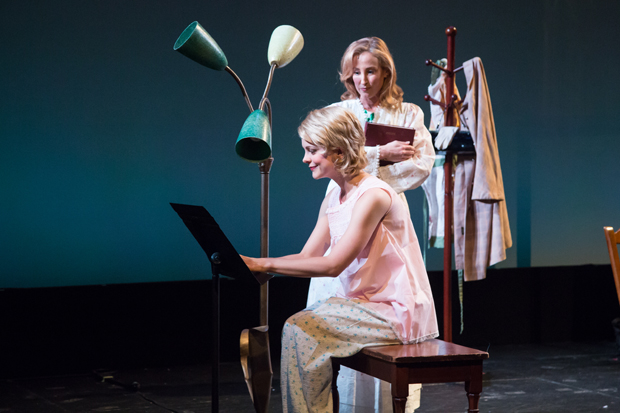NYMF 2018: Between the Sea and Sky; The Gunfighter Meets His Match; Sonata 1962
This is TheaterMania’s fourth and final review roundup from the 2018 New York Musical Festival.

(© Marc J. Franklin)
By Hayley Levitt
Between the Sea and Sky, directed by Michael Bello for the New York Musical Festival, has some lovely melodies by Luke Byrne that convey the mysterious and sweeping soundscape of water. His book, however — part mystery, part coming-of-age story — casts a lot of lines that it hasn't yet figured out how to reel in.
At the top of the show, we see 9- and 14-year-old sisters Emily (Jessica Turk) and Sam (Jenny Rose Baker) learn that their parents are divorcing, and they'll be spending the next four weeks with their grandmother (Barbara McCulloh) in a tiny seaside town called Diamond Beach (an earthy environment filled with wood and seashells by scenic designer Joshua Warner). After some time there, the girls hear the lore of Mary and Charlotte Dawson, a hippie woman and her daughter who is presumed to have drowned under mysterious circumstances 30 years ago. Sam and her new local friend (and likely crush), Vincent (Thaddeus Kolwicz), set out to find the truth of what happened to Mary and Charlotte, seeking the help of Pat O'Reilly (also played by McCulloh), an enigmatic recluse who lives in a lighthouse and has information about the Dawson girls. The whole adventure ends up putting Emily in harm's way and teaching Sam about sisterly love, but through all of the plot twists — supernatural and otherwise — you never quite know what any of Byrne's characters truly want.
Sam is portrayed as a spunky, often indelicate teenager obsessed with Shakespeare's most fantastical characters. Jumping into the middle of a ghost story is right up her melodramatic alley (transitions from sunny seaside to eerie ghost town accentuated by lighting designer Jessica Creager), but we need her to have some kind of internal battle to mirror the external ones she faces on the beach. Her parents' divorce is introduced as a pivotal moment in her life, but is shrugged off as something about which she's only mildly peeved. The development and resolution of Pat's character, meanwhile, is truncated to make room for a musical version of The Tempest (Grandma makes Sam join the production), a collection of scenes that stop the plot for the sole sake of comic relief.
Between the Sea and Sky could be a musical about companionship, loyalty, and perseverance — or something more akin to a musical episode of Are You Afraid of the Dark? Right now it's something in between, and despite the title, it needs to make a choice.

(© VP Visuals)
The Gunfighter Meets His Match
By Zachary Stewart
Ever since Puccini wrote La Fanciulla del West, the Wild West has been fertile territory for the musical theater. That's certainly true for Abby Payne in her beautifully composed (if messily staged) musical, The Gunfighter Meets His Match. It tells the story of a girl (Kristen DiMercurio) who falls in love with a gunfighter (Michael Hunsaker), even though she's already married to a guy named George (Nolan Muña). Guilt drives them apart, while the responsibility to protect the town from the villainous Dane (Ryan Lanning) brings them back together.
Payne (book, lyrics, score; she also appears as the saloon pianist) knows how to write a song, and many of her driving ballads wouldn't sound out of place on adult contemporary radio. At the same time, she shows a deep appreciation for the Western genre with a central theme that is reminiscent of the spaghetti western scores of Ennio Morricone (Shara Radin provides a soprano as clear and haunting as that of Edda Dell'Orso).
Unfortunately, director Jeff Davis's more-is-less choreography diverts our attention from every number, almost never in a way that illuminates the story. This is most clearly illustrated in "Me and My .22," a gorgeous song about suppressed longing and reconciliation. Davis's simple blocking for the two vocalists tells that story so much more effectively than the two dream ballerinas desperately twirling around them. Davis's solution to almost every number is for the actors to never stop moving. At least Lanning has the good sense to scowl through his superfluous leg lifts and barrel rolls.
Sporting a wickedly asymmetrical haircut to match his crooked grin, Lanning's inexplicably evil Dane is a delight to watch (as villains often are). Still, we root for our hero and heroine thanks to the real chemistry between the subtly strong DiMercurio and broodingly handsome Hunsaker.
It would be easier to contemplate their untidy love if we weren't so busy focusing on Davis's disorderly staging, which devolves into a mock gun fight with stage combat the likes of which is rarely seen outside a suburban backyard. In order for The Gunfighter Meets His Match to really wow, Payne still needs to meet her director.

(© Shira Friedman Photography)
By Kenji Fujishima
It's easy for artists to present audiences with depictions of sexual intolerance from an earlier time and get them, with the benefit of historical hindsight, to feel superior to the characters onstage. It's braver for artists to challenge such self-congratulation by inspiring audiences to put themselves in the shoes of someone they might deem "less enlightened" and force them to wonder if they would have been any better in similar circumstances.
Such is the exciting gauntlet that book writer Patricia Loughrey and composer-lyricist Thomas Hodges throw down in their based-on-true-events musical Sonata 1962. Margaret Evans (a wholly sympathetic Erin Leigh Peck), is a conservative matriarch who does what most of us would consider the unthinkable when she finds out her musical-prodigy daughter, Laura (Christina Maxwell, exuding a wide-eyed openness to life), was expelled from a prestigious music school for "lewd conduct." The offensive act was a kiss given to her girlfriend, Sarah (AnnEliza Canning-Skinner, appealing in an underwritten role), in a bar in 1962. Laura's struggle with fatigue and memory loss in the show's opening minutes, combined with a concerned phone call that Margaret makes to Dr. Haines (Aaron Ramey, firm yet kindly), clues us in to what Margaret has done to her child.
Margaret is painted as a typical overprotective worrywart just before her daughter goes off to college, but even at her most suffocating, Sonata 1962 never loses touch with her fundamental decency — which makes her anger when she's confronted with Laura's lesbianism all the more gut-wrenching. That frustration pours out in her searing solo number "Take It Off," in which Margaret reveals the depths of her lifelong denial of her daughter's sexual orientation through howls of despair (tellingly, it's the only number in which Hodges adopts a more chromatically dissonant musical style). And yet, even then, we find ourselves feeling less disdain for her than deep regret: Perhaps if only Margaret had lived in a more sexually inclusive time, she might have had the courage to think beyond the more conservative social mores she grew up with.
Sonata 1962 focuses as much on Laura's budding, forbidden romance with Sarah, and director Katherine M. Carter moves between both story lines with impressive fluidity in the show's packed 80 minutes, with Wesley Cornwell's homely-looking set intensifying the sense of intimacy. In the end, though, it's Margaret's arc that stays with you more than Laura's: the tragedy of a mother who truly meant well for her daughter, even if that love led her down a startlingly misguided path, with lasting repercussions. But under the humane gaze of Loughrey and Hodges and as beautifully performed by Peck, Sonata 1962 refuses us the comfort of easy judgments.







